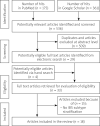Are probiotics useful in the treatment of chronic idiopathic constipation in adults? A review of existing systematic reviews, meta-analyses, and recommendations
- PMID: 32550942
- PMCID: PMC7294971
- DOI: 10.5114/pg.2019.86747
Are probiotics useful in the treatment of chronic idiopathic constipation in adults? A review of existing systematic reviews, meta-analyses, and recommendations
Abstract
Chronic idiopathic constipation (CIC) has emerged as common problem for contemporary gastroenterology and is one of the most frequent complaints in primary care. Chronic idiopathic constipation significantly affects patients' quality of life and has an impact on global health and economy. Functional gastrointestinal disorders and bowel disorders, according to Rome IV criteria, result from inappropriate gut-brain interactions. The pathophysiology is complex and poorly understood, with evidence accumulating that gut microbiota can be implicated in the development and function of the enteric nervous system. Gut bacteria modulate gut barrier function, short chain fatty acid synthesis, and bile acid metabolism, factors which play roles in the gut peristalsis regulation. The high prevalence of CIC, with poor treatment outcomes, warrants searches for new forms of therapy, including probiotic therapies. Probiotics are often recommended by medical practitioners, but evidence-based utility in adults with CIC is uncertain. Recommendations/guidelines are often based on results from individual studies, rather than meta-analyses or umbrella reviews. Additionally, meta-analyses often indicate a group of probiotics rather than individual strains, and they create difficulty for physicians in making therapeutic choices. More CIC patient randomised clinical studies utilising well-defined strains, or combinations, are necessary.
Keywords: chronic idiopathic constipation; irritable bowel syndrome; meta-analysis; microbiota; probiotics; recommendations; systematic review.
Copyright: © 2020 Termedia Sp. z o. o.
Conflict of interest statement
I.Ł. and W.M. are foundation shareholders in Sanprobi, a probiotics distributor/manufacturer, and M.K. and K.S.Ż receive remuneration from this company. It should be noted that the content of this study was neither restricted nor constrained by this fact. A.K. has no conflict of interest to declare.
Figures



References
-
- Lacy BE. Update on the management of chronic idiopathic constipation. Am J Manag Care. 2019;25:S55–62. - PubMed
-
- Wald A. Constipation: advances in diagnosis and treatment. JAMA. 2016;315:185–91. - PubMed
-
- Sharma A, Rao S. Constipation: pathophysiology and current therapeutic approaches. Handb Exp Pharmacol. 2017;239:59–74. - PubMed
-
- Everhart JE, Ruhl CE. Burden of digestive diseases in the United States part I: overall and upper gastrointestinal diseases. Gastroenterology. 2009;136:376–86. - PubMed
Publication types
LinkOut - more resources
Full Text Sources
Miscellaneous
